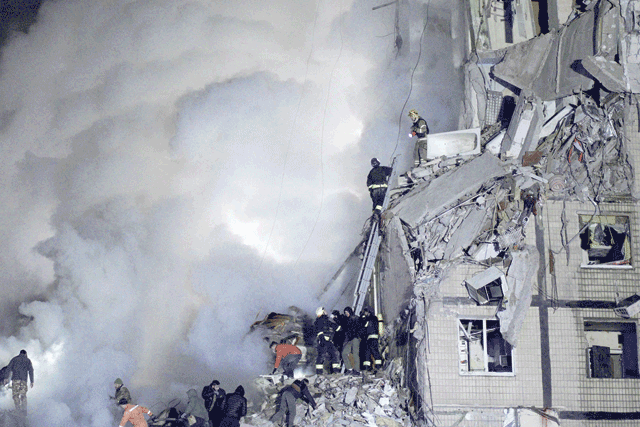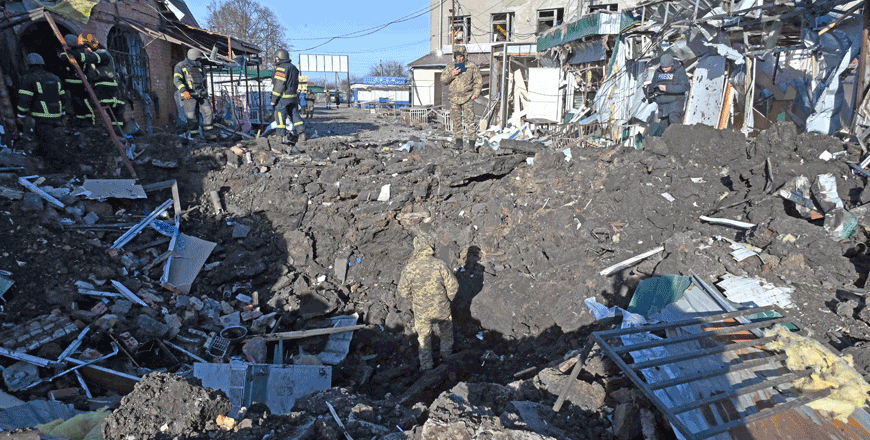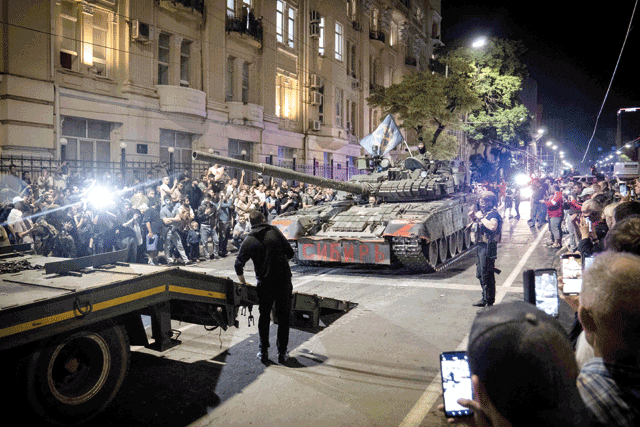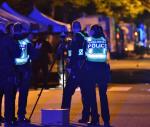You are here
Ukraine puts Dnipro toll at 21 after wave of Russian strikes
By AFP - Jan 15,2023 - Last updated at Jan 15,2023

Rescuers work on a residential building destroyed after a missile strike, in Dnipro, on Saturday (AFP photo)
KYIV — Ukraine said Sunday that the death toll had risen to 21 after a Russian missile slammed into a tower block in the city of Dnipro during a massive wave of strikes causing power outages and blackouts across the war-torn country.
Officials said more than 40 people were still missing after the Dnipro strike Saturday, which came as Ukraine celebrated the Old New Year holiday and as Britain became the first Western country to offer Kyiv the heavy tanks it has long sought.
At least 21 people were killed and 73 others wounded in the attack on the Dnipro tower block, Ukraine's regional council head Mykola Lukashuk said.
A 15-year-old girl was among the dead, officials said, after dozens of people were pulled from the rubble, including a woman brought out by rescuers on Sunday.
"Rescue operations continue. The fate of more than 40 people remain unknown," regional governor Valentyn Reznichenko said.
The strike destroyed dozens of flats in the apartment block leaving hundreds of people homeless, said Kyrylo Tymoshenko, a senior official at the presidency.
The Ukrainian army said the block was hit by an X-22 Russian missile that it lacked the capacity to shoot down.
“Only anti-aircraft missile systems, which in the future may be provided to Ukraine by Western partners... are capable of intercepting these air targets,” it said.
Ukrainian President Volodymyr Zelensky on Saturday pleaded for more Western military weapons, saying that Russian “terror” could be stopped only on the battlefield.
“What is needed for this? Those weapons that are in the warehouses of our partners,” Zelensky said.
British tanks
On Saturday, British Prime Minister Rishi Sunak pledged to provide Challenger 2 tanks to Ukraine, the first Western country to supply the heavy tanks Kyiv has been demanding.
The tanks would arrive in Ukraine in the coming weeks, Downing Street said, adding that Britain would also train the Ukrainian armed forces on how to use them.
Russia’s embassy in Britain warned that “bringing tanks to the conflict zone... will only serve to intensify combat operations, generating more casualties, including among the civilian population”.
Moldova, Ukraine’s south-western neighbour, said it had found Russian missile debris on its territory after Saturday’s strikes.
“Russia’s brutal war against Ukraine directly impacts Moldova again,” President Maia Sandu tweeted, posting photographs of the wreckage.
Ukraine’s energy facilities were still reeling Sunday from what was a 12th wave of large-scale Russian attacks on energy infrastructure in recent months.
The attacks targeted power infrastructure in the Kharkiv, Lviv, Ivano-Frankivsk, Zaporizhzhia, Vinnytsia and Kyiv regions, Energy Minister German Galushchenko said.
On Sunday, operator Ukrenergo said energy infrastructure was “being restored” but that the attacks had “increased the energy deficit”.
“The period of outages may increase,” it acknowledged.
Zelensky said Ukraine shot down 20 of the more than 30 Russian missiles fired.
Rivalries over Soledar
“Unfortunately, energy infrastructure facilities have been also hit,” he said, adding that the regions of Kyiv and Kharkiv, home to the country’s eponymous second city, were suffering the most.
The strikes came amid uncertainty about the fate of Soledar, a salt mining outpost that Russia claimed to have captured, despite denials from Ukraine.
Both sides have conceded heavy losses in the battle for the town, which had a pre-war population of about 10,000.
On Sunday, the US-based Institute for the Study of War said that “Ukrainian forces are highly unlikely to still hold positions within the settlement of Soledar itself”.
On Friday, Russia’s defence ministry announced that it had “completed the liberation” of Soledar.
Russian paramilitary group Wagner first claimed victory over the city on Wednesday, although the defence ministry initially made no mention of Wagner, only later praising the “bravery” of Wagner’s troops in Soledar.
Late Saturday, Wagner head Yevgeny Prigozhin praised his mercenaries in a veiled jab at Russian army command, which has been criticised for poor coordination and being too far removed from the ground.
Prigozhin attributed Wagner’s victories to a “perfected system of command”.
“Everyone can express his opinion,” Prigozhin claimed, “but once a decision has been taken, all tasks are fulfilled. It is our group’s strictest discipline that gives us these possibilities.”
Wagner, which has been accused of abuses in the Central African Republic, Libya, Mali, Syria and Ukraine, has recruited thousands of convicts to fight in Ukraine.
Related Articles
MOSCOW — The rebel Wagner mercenary force threatened to march on Moscow on Saturday before announcing a stunning pull-back, as Kyiv seized o
MOSCOW — Russian-backed separatist forces in the eastern Donetsk region of Ukraine said on Monday they had seized a village near the key cit
MOSCOW — Wagner mercenaries were headed back to base on Sunday after Russia's President Vladimir Putin agreed to allow their leader to avoid



















